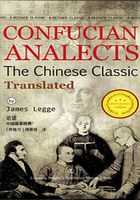
CHAPTER 18
1. Tsze-chang asked, saying, "The minister Tszewăn thrice took office, and manifested no joy in his countenance. Thrice he retired from office, and manifested no displeasure. He made it a point to inform the new minister of the way in which he had conducted the government;—what do you say of him?" The Master replied, "He was loyal." "Was he perfectly virtuous?" "I do not know. How can he be pronounced perfectly virtuous?"
16. HOW TO MAINTAIN FRIENDSHIP. 'Familiarity breeds contempt', and with contempt friendship ends. It was not so with Gan P'ing, another of the worthies of Confucius' times. He was a prin. Minister of Ts'e(齐), by name 婴. P'ing (= 'Ruling and averting calamity') was his posth. title. If we were to render 仲, the name would be 'Gan P'ing, secundus'. Obs. the anteced. to之is人.
17. THE SUPERSTITION OF TSANG WAN. Tsang Wăn (wăn is the hon. epithet, and 仲, see last ch.) had been a great off. in Loo, and left a reputation for wisdom, which Conf. did not think was deserved. His full name was 臧孙辰. He was descended from the duke 孝 (B.C.794-767), whose son was styled 子臧. This Tsang was taken by his descendants as their surname. This is mentioned to shew one of the ways in which surnames were formed among the Chinese. 蔡 'a large tortoise', so called, because the state of that name was famous for its tortoises. 居 is used as an act. verb,=藏. The 节=柱头斗棋, 'the capitals of the pillars'. The 梲 may be seen in any Ch. house. There being no ceilings, the whole structure of the roof is displayed, and these small pillars are very conspicuous. The old interpr. make the keep. such a tortoise an act of usurpa. on the part of Tsang Wăn. Choo He finds the point of Conf. words in the keeping it in such a style.

2. Tsze-chang proceeded, "When the officer Ts'uy killed the prince of Ts'e, Ch'in Wăn, though he was the owner of forty horses, abandoned them and left the country. Coming to another state, he said, 'They are here like our great officer, Ts'uy,' and left it. He came to a second state, and with the same observation left it also;—what do you say of him?" The Master replied, "He was pure." "Was he perfectly virtuous?" "I do not know. How can he be pronounced perfectly virtuous?"